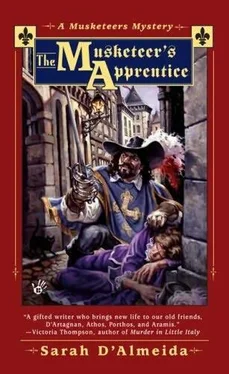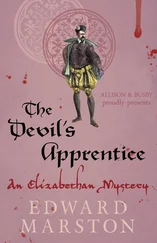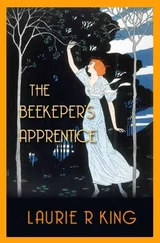Sarah D'Almeida - The Musketeer's Apprentice
Здесь есть возможность читать онлайн «Sarah D'Almeida - The Musketeer's Apprentice» весь текст электронной книги совершенно бесплатно (целиком полную версию без сокращений). В некоторых случаях можно слушать аудио, скачать через торрент в формате fb2 и присутствует краткое содержание. Жанр: Триллер, на английском языке. Описание произведения, (предисловие) а так же отзывы посетителей доступны на портале библиотеки ЛибКат.
- Название:The Musketeer's Apprentice
- Автор:
- Жанр:
- Год:неизвестен
- ISBN:нет данных
- Рейтинг книги:4 / 5. Голосов: 1
-
Избранное:Добавить в избранное
- Отзывы:
-
Ваша оценка:
- 80
- 1
- 2
- 3
- 4
- 5
The Musketeer's Apprentice: краткое содержание, описание и аннотация
Предлагаем к чтению аннотацию, описание, краткое содержание или предисловие (зависит от того, что написал сам автор книги «The Musketeer's Apprentice»). Если вы не нашли необходимую информацию о книге — напишите в комментариях, мы постараемся отыскать её.
In a search for his apprentice's killer, Musketeer Porthos rallies his friends to discover who was responsible, pursuing the truth even as he puts his own life in danger.
The Musketeer's Apprentice — читать онлайн бесплатно полную книгу (весь текст) целиком
Ниже представлен текст книги, разбитый по страницам. Система сохранения места последней прочитанной страницы, позволяет с удобством читать онлайн бесплатно книгу «The Musketeer's Apprentice», без необходимости каждый раз заново искать на чём Вы остановились. Поставьте закладку, и сможете в любой момент перейти на страницу, на которой закончили чтение.
Интервал:
Закладка:
“Athenais, the only thing I want to know is whether Guillaume went there and to whom he might have talked.”
The Domains of a Provincial Lord; A Paternal Welcome; When Winning a Duel Would Be the Worst Thing
THE travel to Porthos’s domains was unexceptionable; the horses Monsieur de Treville had loaned them were swift and even their servants, riding somewhat behind, had been provided with fast horses. Still, by the end of the second day-having overnighted and changed horses- for horses of like quality-in a hostelry of dubious cleanliness-Athos was wondering if Porthos’s domains were mythical, or perhaps placed so far from the capital that they might as well be mythical.
Most of the ride, Porthos had taken the lead in silence, and the others had held still, till Athos wished highwaymen would attack them for the sake of creating a diversion. But as night fell, on the second day, Porthos announced, “St. Guillaume du Vallon.”
Athos looked around in confusion. They had been riding for some time along an increasingly dark country road. Light was just enough to let him perceive the time-polished stones of an old Roman road underfoot, and the glimmer of a farm house, here and there, amid the thickets of trees that lined the path. “Here?” he said, thinking Porthos joked. “In this wilderness?”
Porthos laughed, the first time he had done so, in their entire voyage. He’d slowed down, so they could catch up with him, and he took his horse at a measured walk, so they could talk. “Indeed,” he said. “I told you it was a little place.”
But as they got farther down the road, they could see the smoke of a half dozen houses, dark against the evening sky. And farther on still, past what looked like no more than miserable hovels and a bit down a winding road, there appeared what seemed to be a pile of ruins in huge, golden stones.
It was only by squinting at it that you could see that only the sides and a part of the front were ruined, but at least a quarter of the house was kept in reasonable repair, and smoke climbed from a vast, central chimney.
Porthos dismounted in front of the entrance door-a huge door of what appeared to be age-old oak, inset in a carved stone arch that looked to be even older-and tied his horse to an iron ring firmly embedded in the stone.
Though Porthos would rather die than admit to it, Athos could guess his friend’s reluctance-from a certain hesitant step to his walk, a certain diffidence in the set of his shoulders. He hastened to dismount and tie his horse besides Porthos’s and to stand beside his friend. With no more than a moment’s pause, Aramis and D’Artagnan stepped up on either side of them.
Their servants, riding behind, had stopped behind a ways, and huddled in a group, talking in low whispers of who knew what, but keeping their distance.
Meanwhile Porthos applied his huge fist to the door, making it shake and groan under his pounding. It seemed like an eternity before dragging steps were heard from within and, at long last, a woman opened the door. She was small and withered and grey haired, attired in a dress of undyed wood. For a horrified moment-given their different sizes-Athos wondered if this was Porthos’s mother.
But then the little colorless face set itself in an expression of disbelief, and the pale blue eyes, which also gave an impression of colorlessness opened wide. “Milord,” she said. “Monsieur Pierre.”
“Marie,” Porthos said, and smiled, pulling the little woman to him. Then he turned to his friends and said, “This is Marie, who was my nursemaid. My mother died at my birth, so Marie raised me. You may blame her for anything you don’t like in my behavior.”
“Your behavior,” Marie said, looking up, horrified, as though thinking that anyone who had anything to say to her nursling’s behavior must find it unexceptionable. “You were always the best child and the best of young men. Raised him as my own, I did,” she said, turning to the others and smiling. “And he never gave me any trouble, really, but Pierre…” She looked at Porthos with real worry. “Why did you come back? Your father has declared that your name shall not be mentioned in this house.”
“My father has?” Porthos asked, puzzled. “But… why? When I left I only did what he told me to, and I’ve done nothing to shame him or-”
The woman shook her head. “It is the boy, Pierre. Your boy. When you sent him here, how could you think that he would be well received, and by your father, yet? But you always were a bighearted fool.”
“The boy? He came here? He…?”
From within came a thunderous voice. “Who are you speaking with at the door, you fool of a woman? Who would you occupy yourself with that way?”
Marie shrieked and stepped back and the door was fully thrown open. In opening, it revealed a hall such as Athos had only seen in the oldest of manor houses-a vast, resounding, echoing space, paved in stones, with a vast hearth burning bright at its center, vast enough for the hundreds of knights and thousands of vassals who would cower in here when the enemy threatened and rounded on the fields outside. But this hall was empty and echoing dark, except for the fire in the center which seemed to cast more shadows than light into spaces one felt had been little used.
Out of that darkness, pierced by fiery reflections from the flames, a man strode. He was as tall as Porthos, white haired, with flashing grey eyes, and he might have been the fire god of some forgotten mythology. As he advanced on them, his gaze found Porthos, then slid away from him, while his features set in seething rage.
“What do you want, gentlemen?” he asked. “This is not a hostelry, nor a common house, such as you might be used to. It’s a manor house and a poor enough one that we can’t put up strangers as our guests. Go and find yourself some place to spend the night. It won’t be here.”
Athos had only to look to his right to see Porthos standing still, pale, as though struck by a thunderbolt, and no more able to defend himself than a child when confronted by an adult. That his father had, assuredly, been Porthos’s size once himself, was obvious. The past strength was still there, in arms knotted with muscles protruding from what looked like a short-sleeved peasant shirt. The breeches below ended just beneath the knees leaving equally muscular legs exposed. He wore what Athos could only presume to be some sort of hunting boot, in a style that hadn’t been fashionable for centuries. But such as he was and such as he stood-his feet apart, his arms crossed on his chest, his gaze threatening to call down Olympian thunderbolts- still, he had lost mass and probably strength. He stooped. The hair was all white save where the reflection of the red fire gave it back lost color. And Athos suspected that if the hall were better lit, it would show the man was wasted and weak.
But this light didn’t show it, and besides, he was Porthos’s father, the recipient of respect inculcated in those distant days of childhood when the reason for respect need not be rational, and the simple fact that his father was such, and a lord, and stronger than Porthos would have been enough to control the wayward boy’s rebellion.
“I do not mean to disturb you,” Athos said, putting on his best and haughtiest manner, his coldest and most polite air. “But we were under the impression that friends of your son, and your son himself might very well be allowed to shelter in your home for a night’s sojourn.”
The grey eyes that turned to meet Athos’s gaze might be the same color as Porthos’s, but the resemblance stopped there. Beyond the grey color and the same shape, there was nothing of Porthos’s warmth in that look. Only cold, icy resentment and a soul that knew its own truth and cared not for anyone else’s opinion. “I don’t know how you could be so imposed upon,” the lord said, his voice cold. “But the truth is that I had one son only and he died, years ago. I don’t know who the imposter in your midst is, pretending to be my son, but he’s none of mine. Go. Leave me alone with my old age and my grief.”
Читать дальшеИнтервал:
Закладка:
Похожие книги на «The Musketeer's Apprentice»
Представляем Вашему вниманию похожие книги на «The Musketeer's Apprentice» списком для выбора. Мы отобрали схожую по названию и смыслу литературу в надежде предоставить читателям больше вариантов отыскать новые, интересные, ещё непрочитанные произведения.
Обсуждение, отзывы о книге «The Musketeer's Apprentice» и просто собственные мнения читателей. Оставьте ваши комментарии, напишите, что Вы думаете о произведении, его смысле или главных героях. Укажите что конкретно понравилось, а что нет, и почему Вы так считаете.










